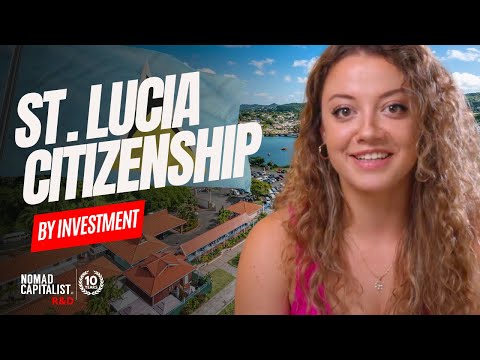The Cost of Living in St Lucia: 2025 Guide
July 14, 2025
Once a coveted prize of the Caribbean, the now peaceful paradise of St Lucia was over no less than fourteen times by the British and French.
Legend has it that infamous pirates like Peg Leg and Blackbeard were also drawn to St Lucia by its abundance of rum and tales of buried treasure.
Today, the island named for Saint Lucy of Syracuse has traded conflict for calm, drawing travellers and investors to its lush mountains, world-class sailing and highly regarded citizenship-by-investment programme.
But how much does life here actually cost?
Current surveys put day-to-day expenses roughly 50 per cent lower than in the United States and noticeably below those in pricier Caribbean hubs like the Bahamas and Cayman Islands.
In other words, capital stretches further while the lifestyle improves.
The Nomad Capitalist team has compiled a detailed look at St Lucia’s living costs – from housing and groceries to healthcare and transport – along with the practical steps for securing St Lucian citizenship for those ready to make the island more than a holiday destination.
St Lucia Cost of Living: Overview
Before considering a move to St Lucia, it’s essential to first understand the cost of living and the state of the economy.
With a gross domestic product of around US$2.3 billion in 2024, the country performs well in regional terms. Tourism, which contributes nearly 10% of GDP, attracts around 1 million visitors annually, particularly for weddings and honeymoons.
In response to issues with unemployment and limited economic diversity, the government launched a citizenship-by-investment program to attract investors.
Since its establishment in 2015, St Lucia’s citizenship by investment program has generated over US$60 million through the National Economic Fund (NEF) while funding transformative infrastructure projects worth nearly US$1 billion.
Cost of living facts:
- Because of its remote location, imported goods and services tend to be more expensive.
- The local currency is the Eastern Caribbean Dollar, which is pegged to the US Dollar.
- The capital city of Castries is the most expensive area to live in, where goods and services are significantly more expensive than in other regions.
- The average salary after taxes in St Lucia is around US$1,230 per month.
St Lucia remains relatively affordable compared to other Caribbean nations.
Cost of Living: Buying and Renting in St Lucia
The expatriate community in St Lucia is concentrated in the north, especially near Rodney Bay and Cap Estate. Smaller groups live in Castries and Soufrière.
St Lucia’s capital, Castries, typically has average property prices of US$500 per month to rent a one-bedroom apartment, while buying property will cost over US$1200 per square meter.
Housing and real estate market costs in St Lucia vary greatly by location and level of luxury. In prime areas like Rodney Bay or Cap Estate, a one-bedroom apartment rents for US$735–US$1,100 monthly, while in other areas, prices range from US$441 to US$735. Premium properties may exceed US$1,100.
St Lucia Cost of Living: Utility Costs
The cost of utilities, such as electricity and air conditioning, can add up quickly in St. Lucia. Here’s a breakdown of typical monthly costs for residents:
- Electricity, heating and water: average around US$147 per month
- High-speed internet: US$73 per month
- Mobile data: US$35 per month.
These living expenses will vary depending on household size and usage.
St Lucia Cost of Living: Food
People in Saint Lucia usually shop for groceries at local supermarkets, convenience stores and markets. Many also visit larger chains like Massy Stores. The biggest impact on your grocery budget will be whether you are buying local or imported goods.
Some basic food prices you can expect:
- Milk 1 litre US$2.21
- Loaf of fresh bread US$1.47
- Eggs x12 US$4
- Water 1.5 litres US$1.23
- Bottle of wine US$11
- Domestic beer US$2
- Imported beer US$4.32
- A meal for two at a mid-range restaurant: US$73.50.

St Lucia Cost of Living: Healthcare Costs
Healthcare in St Lucia includes both public and private facilities. Many expatriates opt for international health insurance with evacuation coverage. Some average healthcare costs include:
- Private health insurance: US$200 to US$400
- Doctor’s consultation fee: US$55
- Specialist visits: US$75.
St Lucia Cost of Living: Transportation
Transportation in St Lucia includes private vehicles, taxis and minibuses. With limited public transport, most expatriates who stay for longer periods opt to own vehicles despite high import duties and maintenance costs.
Here is a snapshot of transport costs in St Lucia:
- Local bus fare: US$1.19
- Taxi (normal tariff): US$9
- Monthly vehicle expenses: US$220.
Cost of Living in St Lucia vs the United States
Overall, the average cost of living in Saint Lucia is around half of that in the United States.
- Monthly rent prices in St Lucia are 71% lower than in the US
- Restaurant prices in St Lucia are 34% lower than in the US
- Grocery prices are slightly lower than in the US.
Another significant benefit of St Lucian residency and citizenship over the US is the favourable tax system. The country does not levy taxes on worldwide income, capital gains, wealth or inheritances.
St Lucia Citizenship by Investment
St Lucia’s Citizenship-by-Investment (CBI) Program was launched with the aim of stimulating the economy, which at the time struggled with high unemployment and debt.
The program enables applicants to obtain citizenship in exchange for an economic contribution.
Unlike other Caribbean CBI programs, St Lucia offers diverse investment options:
- A one-time non-refundable donation of US$240,000 to the Saint Lucia National Economic Fund (SLNEF) for an applicant applying alone with up to three other qualifying dependents.
- An investment of US$300,000 in pre-approved real estate.
- A US$300,000 investment in government bonds for five years.
- A minimum investment of US$3.5 million in a local enterprise project.
Administration fees should also be taken into account and range between US$30,000 and US$50,000 per applicant.
See how St Lucia stacks up against the other Caribbean citizenship by investment programs in our comparison guide.
Benefits of Citizenship in St Lucia
St Lucian citizenship offers numerous benefits, such as:
- Obtaining your Saint Lucian passport without any interviews or tests.
- Enjoying access to 140 countries, including Europe, the UK, and parts of Asia.
- Citizenship approval typically takes just 3-6 months.
- St Lucia offers one of the most cost-effective CBI options in the Caribbean.
- You can include your spouse, dependent children (under 21 years old), and parents (over 55 years old) for an additional fee.
- No need to live in St Lucia during or after the application.
- Complete the application process entirely online.
- Enjoy lifelong citizenship and passport privileges.
- Various investment options allow you to support the local economy or expedite the process.
- Maintain your original citizenship while holding a St Lucian passport.
- No inheritance, wealth, or capital gains taxes for income earned abroad if not residing in St Lucia.
- Participate in a robust international financial services sector.
Some negative aspects of this citizenship program include the high administration and due diligence fees compared to those in nearby countries, particularly for larger families.

Cost of Living in St Lucia in 2025: FAQs
Haiti, the Dominican Republic, Jamaica, and Cuba are among the most affordable Caribbean islands to live on.
St Lucia has one of the more reasonable costs of living in the region. It is far more affordable to live in St Lucia than on high-end Caribbean islands such as the Bahamas, St Barts and Barbados, but it is more expensive than the likes of the Dominican Republic and Haiti.
A single person’s estimated rent and utilities in St Lucia are around US$500 per month, with additional expenses for food and transportation averaging US$600. The average overall cost of living is approximately US$1,160 to US$1,500 per month. While some living aspects can be affordable, housing in desirable areas and imported goods tend to be expensive.
The benefits of living in St Lucia include a low cost of living and relaxed pace of life in a beautiful landscape with its lush rainforests, stunning beaches, vibrant culture and majestic mountains. Citizenship in St Lucia also comes with many benefits, including travel and tax advantages.
This depends on your lifestyle needs, but some of the best places to live include Castries, Rodney Bay, Marigot Bay and Soufrière, which are favourite spots for expats.
Should You Consider Living in St Lucia?
Saint Lucia’s citizenship-by-investment (CBI) program offers a unique pathway for individuals and families to acquire citizenship through investment.
Whether you’re an entrepreneur, investor or family wanting a tropical paradise, St Lucia might well be your ideal choice.
But this isn’t the only game in town: Antigua and Barbuda, Grenada and Dominica all offer attractive CBI programs, each with unique benefits.
For those seeking a more upscale Caribbean lifestyle, the Bahamas and the Cayman Islands offer residence options along with attractive tax benefits.
Successful offshore relocation involves carefully handling everything from taxes to immigration and business planning and that’s where Nomad Capitalist comes in.
Nomad Capitalist works with high-net-worth individuals to design and execute tailored global strategies.
From tax planning and asset protection to second residency and beyond, every move is structured for maximum freedom and long-term benefit. If you’re ready to move beyond generic advice and build a location strategy that works on every level, get in touch.



Living in Turkey 2025: Expat Guide
Turkey’s true value for a global entrepreneur or expat lies in a duality few other nations can match. It is a place where the economic volatility you read about in the news can directly fuel lifestyle advantages on the ground. The result is the ability to swap a GBP£7,000 monthly burn rate in a city […]
Read more

Moving to Spain from the US: A Guide for Americans
Why do Americans move to Spain? Is it the walkable cities packed with culture? Is it the low cost of living? Is it the access to the rest of Europe at your fingertips? Or is it the food and wine? An estimated 50,000 US citizens now live in Spain. For many, the chance to leave […]
Read more

Living in Malta: The Ultimate Expat Guide for 2025
The world of European investment migration is in a constant state of flux. Under intense pressure from various factions in the European Union, residence by investment programs in countries like Portugal and Spain have been dismantled or radically revamped. Even Malta, one of the most long-standing players in the field, has faced scrutiny, forcing it […]
Read more





